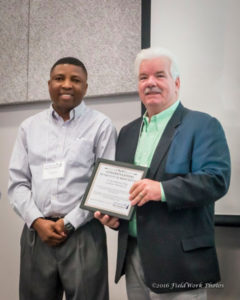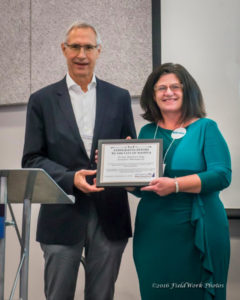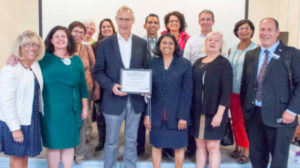by Admin | Jan 29, 2018 | Uncategorized
The Tent Foundation and Lutheran Immigration and Refugee Service (LIRS) recently launched the U.S. Employers’ Guide to Hiring Refugees.
“Companies can show leadership and send an important message by committing to hire refugees. This guidebook, developed in partnership with Lutheran Immigration and Refugee Service, outlines essential information on the logistics, benefits, challenges and solutions related to refugee recruitment and employment retention in the United States.”
The U.S. Employers’ Guide to Hiring Refugees is a manual to assist businesses that are interested in hiring refugees and have questions about the logistics and practicality of hiring refugees in the United States. This Guide contains essential information on a variety of topics related to refugee recruitment and employment, including:
• An explanation of who refugees are and how they arrive in the United States
• The benefits of hiring refugees
• The logistics of finding and hiring refugees
• Common barriers – and solutions – to refugees entering and maintaining employment
Access this toolkit and other resources by visiting: www.tent.org.resources.
by Admin | Jan 26, 2018 | Uncategorized
Second Start, in conjunction with Ascentria Community Services, has received a $15,000 grant from the Lincoln Financial Foundation to provide employment and employability services for refugees resettled in the greater Concord area. The services will focus on job readiness skill development. Obtaining employment can be difficult for new refugees if they have no U.S. work history, limited English skills, missing or non-transferable credentials, or limited transportation and childcare options. The goal is to place 45 participants in employment.
Lincoln Financial Foundation, the philanthropic arm of Lincoln Financial Group, believes in empowering people to live greater lives, which advances culture and empowers greater positive change. Its grant is part of Lincoln Financial’s annual $10 million investment in its local communities’ youth education, economic and workforce development, human well-being and arts programs.
About Second Start
Second Start is a private nonprofit organization committed to improving the economic and educational well-being of New Hampshire residents. Our goal is to help people become more productive workers, family members and community citizens. We provide supportive, affordable and effective educational programs including but not limited to: Adult Education, Job Training and Career Counseling for at-risk youth and Child Care Services.
About Ascentria Care Alliance
Ascentria Community Services is a subsidiary Ascentria Care Alliance. As one of the largest human service organizations in New England, Ascentria Care Alliance empowers people of all backgrounds to rise together and reach beyond life’s challenges. We are creating an innovative human-centered care model to help individuals and families move forward and thrive – physically, intellectually, socially, spiritually and economically. With many locations throughout the region, Ascentria serves children, youth and families; persons with developmental disabilities and mental illness; refugees, including unaccompanied refugee minors; and older adults. Through productive collaborations and partnerships, we create measurable, positive impact that enriches our communities. Inspired by our faith-based heritage and guided by compassion, courage and integrity, we envision a world in which everyone can realize their fullest potential and share with others in need. To learn more, please visit us at ascentria.org and follow Ascentria on Facebook and Twitter: @ascentria
About Lincoln Financial Foundation
The Lincoln Financial Foundation, established in 1962, is a nonprofit organization formed and supported by Lincoln Financial Group. Under the Foundation guidelines, grants are made in the areas of arts, education, human services and economic/workforce development.
by Admin | Jan 8, 2018 | Uncategorized


Read an excerpt from The Sillerman Center’s latest newsletter featuring the immigrant integration work happening in New Hampshire, and watch for the full brief being published soon!
“The Sillerman Center regularly publishes Social Justice Funder Spotlight briefs (see here) and we are excited to feature New Hampshire’s immigrant integration initiative in our next brief, to be published in early 2018. This brief will demonstrate how several individual foundations came together in collaborative grantmaking to support ethnic community organizations and events across the state, and how the collaboration has benefited New Hampshire. We hope that the great work being done by these foundations will serve as an example to other philanthropic organizations who may not necessarily self-identify as immigrant funders but who are interested in taking a greater role in creating more welcoming, inclusive, and equitable communities.”

Shared from The Sillerman Center for the Advancement of Philanthropy, Brandeis University
by Admin | Jan 2, 2018 | Uncategorized

By: Kenneth M. Johnson
SUMMARY
The population of New Hampshire grew by 7,800 between July of 2016 and July of 2017 to 1,343,000 according to new Census Bureau estimates. This is the largest population gain for the state since 2005 and 60 percent greater than last year, though it remains modest compared to gains in the 1980s and 1990s. Migration accounted for nearly all of the growth. New Hampshire had a net domestic migration gain of nearly 4,700 residents in migration exchanges with other states last year, compared to just 1,800 in the previous year.
This is a striking change from earlier in the decade when more people left New Hampshire for other U.S. destinations than moved to the state. New Hampshire also received 2,200 immigrants from other nations last year. Births in New Hampshire only minimally exceeded deaths and thus contributed little to the population gain. The gain from natural change was only 900 because the 12,500 births last year were largely offset by 11,600 deaths. Births have been diminishing in New Hampshire because fertility rates are low and there are relatively few women of child-bearing age. Deaths are increasing because of higher mortality among the aging population and a substantial rise in drug-related deaths to young adults.

This article has been shared from the Carsey School of Public Policy at the University of New Hampshire. Access the article here.
by Admin | Dec 12, 2017 | Uncategorized
There is no legal definition for a “Sanctuary city”. Nevertheless, a commonality among cities that have adopted sanctuary-type policies is a desire to resist changes in the law that would require local criminal law enforcement agencies to do the federal government’s job of enforcing immigration laws. Many do this by preventing local officials from asking people about their immigration status. Other cities refuse to use local resources to detain immigrants. The main purpose for these types of policies is to comply with constitutional requirements and to protect public safety by maintaining positive relationships between local law enforcement and immigrant communities.
Studies have shown that immigrants are less likely to report crimes, or cooperate in criminal investigations, if they fear potential deportation as the result of routine interaction with local law enforcement agents. Even if politically contentious, these are policies are legally sound and are seen by many localities as good public safety policy.
While the term is not associated with our programming, some cities in the Welcoming America network have chosen to adopt what could be considered sanctuary-type policies to guide the actions of their law enforcement personnel, others have not. We stand in support of those cities. It is truly up to the city to determine if they should do so. Though they may share similar principles, self-identified “Sanctuary cities” are not necessarily Welcoming Cities and vice versa.
Welcoming America’s ultimate goal is to build more inclusive, prosperous communities. Communities create and implement what works best and is needed to achieve this goal; we support their efforts and the policies they choose to enact.
Written and published by Welcoming America.





